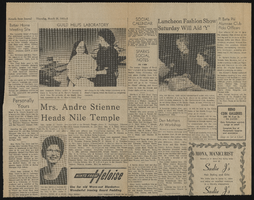Search the Special Collections and Archives Portal
Search Results

Transcript of interview with Margaret Price by Joanne Goodwin, March 5, 1997
Date
Archival Collection
Description
When farm-girl-turned-waitress, Margaret "Maggie" Price, came to Las Vegas from Ohio in 1950 with her husband, Francis "Frank" Price, she had no idea what was in store for her in the hot desert oasis. Maggie's career spanned a period of historical transformation in Las Vegas when Downtown was becoming overshadowed by the development on the Las Vegas Strip. Vaudeville and striptease acts were still alive, but the arrival of big-named acts, such as the Rat Pack, Barbara Streisand, and the King himself, Elvis Presley, were just beginning to take the lead. Organized crime was still a prominent part of the culture and brothels still operated somewhat openly. The three decades Maggie and Frank worked in Las Vegas provided them with front-row seats for the birth, transformation, and occasional death of numerous casinos, including the Sahara, the Flamingo, the Sands, the Dunes, the Tropicana, and the International. Initially going to work as a waitress at the El Rancho Vegas, Maggie
Text

Transcript of interview with Stella Butterfield by Joanne Goodwin, October 14 & October 25, 2005
Date
Archival Collection
Description
Interviewed by Joanne L. Goodwin. Stella Butterfield's family, the Goldbergs, was Jewish, and she was born in the Bronx. During World War II she worked for the Coast Guard in the steno pool in Washington, D.C. Stella moved to Santa Monica a few years later while the war was still going on and worked briefly as a riveter for Douglas Aircraft and then as a teletype operator for the Air Force but at Douglas Aircraft. Because she had a hard time getting a job because of antisemitism, she changed her name to Gilbert. In December of 1948 she went to the Canal Zone in Panama to be the secretary of the commanding officer of the Panama Supply Depot. Stella was also a law reporter for court martials. She met Frank Butterfield, who was stationed there, and married him in 1952. He was transferred back to the United States, and they lived in Massachusetts. Then they moved to Los Angeles, and in 1953 they moved to Las Vegas, where she was a court reporter at Nellis Air Force Base. Then they moved to Mexico City, then back to California where she worked as a legal secretary. In early 1955 they moved back to Las Vegas, and Stella worked as a federal court reporter for Judge Roger T. Foley.
Text

Transcript of interview with Renee Marchant Rampton by Dr. Caryll Batt Dziedziak, September 25, 2015
Date
Archival Collection
Description
Renee Marchant Rampton has often referred to herself as "One of Fifteen." Indeed, growing up in a family of fifteen children, Renee experienced the care of loving parents, the excitement of a bustling household, and the engagement of an active Church; all amidst the strains of a depression era economy. Renee's mother, Beatrice Marchant, provided Renee with a strong role model with which to emulate; a disciplined woman, who rose to the task without hesitation. Beatrice became the family's provider after her husband's debilitating stroke and later served in the Utah Legislature during the 1970s. Renee loved music from an early age. As a young child she found an early job as a piano accompanist for a dance studio. In 1956 she married musician, Roger Rampton, a successful percussionist. They soon settled in Las Vegas, where Roger performed on the Strip and they began raising their four children. It was an exciting period in Las Vegas history as the Strip attracted musicians and
Text

Transcript of interview with Danny Lee by Claytee White and Stefani Evans, May 23, 2016
Date
Archival Collection
Description
Folks who graduated Boulder City High School in 1953 and who began kindergarten there might remember being in kindergarten class with Clark D. "Danny" Lee. They would be excused for not remembering the towheaded Lee; after all, he was in Boulder City only for the first half of the year. They also would be excused for not remembering Lee because he never stayed in school once he arrived. Danny was the child whose mother faithfully brought him to class every day. And every day, as soon as his mother dropped him off, he took off and beat his mother home. Danny Lee was born in his grandparents’ house in North Las Vegas, grew up on 10 Bonneville Street, and (except for his first semester of kindergarten in Boulder City) attended Fifth Street Elementary School and Las Vegas High School, where he graduated in 1953 with Rex Bell. In 1960 he married fellow Las Vegas High grad and former Rhythmette, Dorothy Damron; they have raised four children. Here, Lee talks about the difficulties his father had finding work and supporting a family during the Great Depression-of living with relatives and moving from place to place in the small travel trailer as his father found work. He describes a hardscrabble Las Vegas, where he and other kids in in multiethnic groups found temporary work helping drovers in the stockyards or filling blocks of ice in the icehouse. He recalls working for Superior Tire during high school and for the Union Pacific Railroad in a variety of jobs after graduation and the U.S. Army-including a stint as a Union Pacific tour director. v Lee’s early kindergarten career seems an unlikely academic indicator for a man who would spend most of his adult life volunteering for and lobbying on behalf of Clark County public libraries and who the American Library Association would select as the 1990 Library Trustee of the Year. Ironically, Lee was asked to serve on the Clark County Library District board of directors to get rid of a troublesome library director. Instead, he became one of the director’s staunchest advocates. It is appropriate that Danny and his wife, Dorothy, are pictured here surrounded by library books. The native Las Vegan built a lifetime career as a State Farm Insurance salesman, but in this interview he focuses on his public library advocacy, his time as trustee for the Clark County Library District; the formation of the Las Vegas-Clark County Library District; the ambitious building program funded by $80 million in voter-approved statewide bonds; and the political wrangling in Carson City necessary to achieve these ends. Lee’s oral history complements that of his wife, Dorothy Lee, and of Charles Hunsberger, who was the “troublesome” library director at the time Lee was trustee. Lee made his living as an insurance salesman. Lee’s ability to sell a product-whether it be insurance or an $80 million bond issue-is the attribute that made Danny Lee so valuable as a trustee to the Las Vegas-Clark County Library District and consequently, to all Clark County residents who value public library services. However, his passion, and dedication, and unbowed determination earned him the Library Trustee of the Year award. As Lee closes the interview, he locks eyes with Dorothy and muses, "Let me tell you what I'm most proud of in all . . . I've been married to this lady for fifty six years now. . . . I've lived a very blessed life. Being born in my grandmother's house and having lived in little travel trailers, it's just good. It's worked. We're living like we've always wanted to live right now."
Text

Transcript of interview with Alice Thiriot Waite by Carole Terry and Donna Andress, October 19, 2011
Date
Archival Collection
Description
The memories and recollections of Alice Thiriot Ballard Waite provide a most interesting look at both at the Junior League of Las Vegas in the 1970s and the early days of Las Vegas. Alice recalls her childhood and young adult years after she arrived in Las Vegas at the age of five, giving the reader a rare picture of Las Vegas in the 1950s and 1960s. She was most active in the volunteer community of Las Vegas and served as Junior League President in 1964-5. Her reminiscences about the events and activities during the years while she was a Junior League member are an invaluable insight into its history. The exhibits she is sharing are an important documentation of those years after the Service League became the Junior League. She herself was a forerunner of today's Active members because she was a single, working mother while serving as the first "professional" President of the League.
Text





